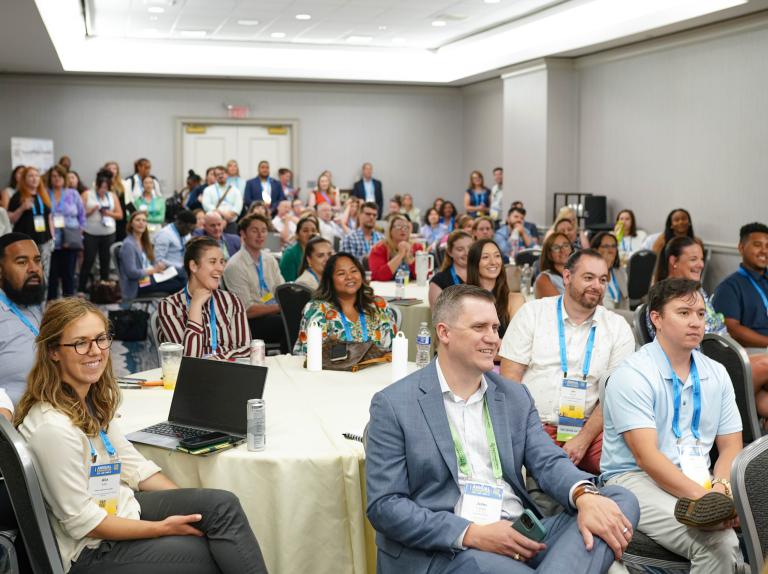
Without a universal image of what destination professionals do, the industry faces significant challenges—from underfunding and undervaluation to missed opportunities and reduced impact. Changing the narrative around destination organizations isn’t just about gaining respect; it’s about ensuring they have the resources and recognition needed to continue stewarding the communities they serve.
Firefighters save lives. Teachers shape minds. Destination professionals? They steward thriving communities.

At first glance, the connection between destination organizations and the well-being of a community may not seem obvious. After all, destination professionals aren’t the ones building roads or running schools. But just like nurses and educators, destination professionals play an essential—albeit less visible—role in making our communities vibrant, successful and resilient. As stewards of community vitality, destination organizations enrich the quality of life for residents, attract and retain talent, foster culture and community, support public services and grow the overall economy.
February 19 marks the inaugural celebration of Destination Professionals Day—a new day of recognition created to raise awareness of the vital contributions made by destination organizations and the professionals who work tirelessly within them. This day is a powerful opportunity to not only recognize their work but to redefine how the public perceives their essential role in the fabric of our communities.
These organizations don’t just promote tourism—they’re strategic hubs of innovation and collaboration that amplify everything great about a destination. Through destination stewardship, they ensure that tourism operates in alignment with shared community values, creating a net positive ecosystem that benefits both residents and visitors. Stewardship means fostering a positive tourism experience for current and future generations, ensuring communities thrive as places to visit, live, learn, work, play and invest.
And yet, the impact is often misunderstood or overlooked. Why? Because unlike firefighters, teachers or nurses, there’s no universal understanding of what a destination professional does. In fact, the lack of understanding is so widespread that family members and others in the hospitality industry often don’t fully grasp the contributions of destination professionals. This only underscores how essential it is to redefine and elevate their role in the public eye.
It’s time to change that.
Eight Ways the Lack of a Universal Image Hurts the Industry
To help us understand how anonymity actually hurts everyone in our industry sector, here are my eight ways.
1. There is a lack of public and political support when people don’t understand the role or value of destination professionals and it’s challenging to build public trust and community backing. Elected officials and decision-makers may view destination organizations as nonessential or dispensable, leading to budget cuts or lack of investment. Without a clear understanding, policies may overlook the needs of destination organizations, stifling their ability to effectively promote or develop a community.
2. Without perceived legitimacy, destination professionals can be viewed as less credible or even unnecessary. Professions like teachers, firefighters and lawyers are instantly recognized and respected. The devaluation of their work makes it harder for professionals to advocate for their importance, especially when the public sees their role as ambiguous or irrelevant.
3. In the competition for talent, the lack of a universal image makes it harder to recruit and retain employees. A profession without clear recognition or respect can struggle to attract and retain top talent. Talented young professionals may not see destination stewardship as a viable or prestigious career path if its value is not well understood. Without recognition or appreciation, destination professionals may feel undervalued, leading to lower morale and higher turnover rates.
4. Despite engagement and collaboration being key aspects of how destination organizations operate, the lack of knowledge by others fosters missed opportunities for collaboration. Without a clear understanding of what destination professionals do, potential partners may not realize how DMOs can support their goals. Local businesses, for example, may fail to engage with destination organizations, missing out on opportunities for economic growth. Similarly, residents may not see DMOs as allies in enhancing quality of life, making it harder to build community engagement and secure buy-in.
5. Destination professionals can be pigeonholed because of limited perception of their strategic value. If the public and stakeholders don’t understand the full scope of destination professionals’ work, the industry can be pigeonholed as solely focused on tourism. This oversimplification overshadows the broader contributions of destination organizations, such as destination stewardship, economic development, and cultural preservation. People may not connect the dots between tourism and the broader economic benefits, like job creation and public service funding, further diminishing perceived value.
6. The ambiguity surrounding the role of destination professionals leaves the industry particularly vulnerable during economic downturns or global crises. Without widespread understanding of their impact, DMOs are often among the first to face budget cuts during financial challenges. In times of crisis, such as a pandemic or natural disaster, explaining how destination professionals contribute to recovery efforts can be a tough sell.
7. Without a universal image, it’s harder to define what success looks like for destination professionals or the industry. Stakeholders may have unrealistic or unclear expectations of what a destination organization can deliver. Additionally, the lack of a consistent, unified narrative weakens the industry’s ability to tell its story and advocate for its needs.
8. When an industry isn’t clearly understood, it struggles to effectively advocate for itself. Without a cohesive image, the industry has less power to influence legislation, policy or public opinion. Destination professionals could be leading conversations about sustainability, economic development and cultural preservation but are often sidelined due to a lack of recognition.

Without a universal image of what destination professionals do, the industry faces significant challenges—from underfunding and undervaluation to missed opportunities and reduced impact. Changing the narrative around destination organizations isn’t just about gaining respect; it’s about ensuring they have the resources and recognition needed to continue stewarding the communities they serve.
As we celebrate the first-ever Destination Professionals Day on February 19, let this day serve as a rallying cry for the recognition these professionals deserve. Whether it is development and management of the destination brand, marketing the destination, attracting conventions, meetings and events, website design and maintenance, visitor and community engagement, event management or the range of support efforts from finance to information technology, it’s not just about honoring their work—it’s about elevating their role as stewards of vibrant, thriving communities. Let’s take this opportunity to tell their story and advocate for the vital contributions they make, ensuring their impact is seen, understood and valued.
Submit Your Thought Leadership

Share your thought leadership with the Destinations International team! Learn how to submit a case study, blog or other piece of content to DI.


